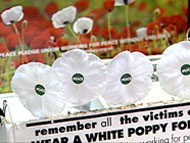 Abraham Lincoln
If given the truth, the people can be depended upon to meet any national crisis...
Abraham Lincoln
If given the truth, the people can be depended upon to meet any national crisis...
 Guildford news...
for Guildford people, brought to you by Guildford reporters - Guildford's own news service
Guildford news...
for Guildford people, brought to you by Guildford reporters - Guildford's own news service
Letter: We Remembered With White Poppies
Published on: 12 Nov, 2013
Updated on: 12 Nov, 2013
Prospective Parliamentary Candidate for The Peace Party
Around ten people gathered quietly in Quakers Acre on Remembrance Sunday morning and stood in a semicircle to listen to a few words that I read out.
After thanking them for coming to join the simple ceremony, I continued, “We are here to remember all those who died in wars and to help ourselves and others to seek ways forward to resolve differences between people without resorting to bloodshed.”
I said that we were meeting in the hope that all people will commit themselves to a world of peaceful co-existence and to insist that those in power should resist the use of violence and war, whatever happens, that conflicts should always be resolved with justice and without violence.
Over 300 wars later and after the slaughter of over 200 million people the white poppy is a reminder of the world’s failure to prevent war. It is a symbol of people’s determination to work together to abolish war for good. That time has to be now.
White poppies were conceived by the Women’s Co-operative Guild and made their appearance on Armistice Day 1933, 80 years ago. Many members of the guild had lost loved ones in the First World War and they foresaw and feared the next one. The white poppy was born out of this fear and signified hope for a peaceful, a non-violent future.
I continued, “We are here today to mourn and grieve for the women and men the old-style politicians saw fit to send to take part in their wars and who were killed on the battlefield sacrificed by governments for their own purposes and not for the good of humanity.
“We remember them, we respect absolutely what they chose to do and the reasons they saw for going to war and we remember their bereaved families and friends.”
I went on to say that we broadened our grief to include the service men and women who returned home wounded and traumatised as a result of their governments’ wars and that we remembered the women and men and their shattered families.
“We broaden our grief even wider,” I said, “to include all the millions of civilians who had been killed, injured and traumatised, caught up in the politicians’ wars; we remembered them and their families and friends. The loving care, respect concern and compassion one person has for another, and for the whole of humanity, allows no space at all for violence and war, only for a culture of peace.”
I concluded, “As we place the wreath of white poppies here, we re-dedicate ourselves to continue to work for that culture of peace. War must cease to be an inevitable part of our world.”
We then stood in silence for many minutes. One or two spoke briefly before we went our separate ways.
Recent Articles
- Guildford Institute’s Crowdfunding Project for Accessible Toilet in its New Community and Wellbeing Centre
- Letter: Guildford – Another Opportunity Missed?
- Letter: GBC’s Corporate Strategy – Where Is the Ambition?
- My Memories of John Mayall at a Ground-breaking Gig in Guildford Nearly Six Decades Ago
- Westborough HMO Plans ‘Losing the Heart of the Street’ Says Resident
- College Invests to Boost Surrey’s Economy and Close Digital Skills Gap
- Community Lottery Brings Big Wins for Local Charities
- GBC Housing Plan Promises ‘A Vibrant Urban Neighbourhood’ Near Town Centre
- Hospital Pillows ‘Shortage’ at the Royal Surrey
- Updated: Caravans Set Up Camp at Ash Manor School


Search in Site
Media Gallery
Dragon Interview: Local Artist Leaves Her Mark At One of England’s Most Historic Buildings
January 21, 2023 / No Comment / Read MoreDragon Interview: Lib Dem Planning Chair: ‘Current Policy Doesn’t Work for Local People’
January 19, 2023 / No Comment / Read MoreA3 Tunnel in Guildford ‘Necessary’ for New Homes, Says Guildford’s MP
January 10, 2023 / No Comment / Read More‘Madness’ for London Road Scheme to Go Ahead Against ‘Huge Opposition’, Says SCC Leader
January 6, 2023 / No Comment / Read MoreCouncillor’s Son Starts Campaign for More Consultation on North Street Plan
December 30, 2022 / No Comment / Read MoreCounty Council Climbs Down Over London Road Works – Further ‘Engagement’ Period Announced
December 14, 2022 / No Comment / Read MoreDragon Interview: GBC Reaction to the Government’s Expected Decision to Relax Housing Targets
December 7, 2022 / No Comment / Read MoreHow Can Our Town Centre Businesses Recover? Watch the Shop Front Debate
May 18, 2020 / No Comment / Read More










Recent Comments